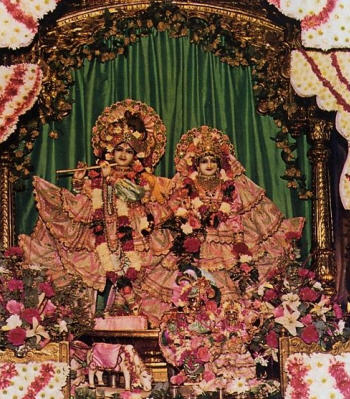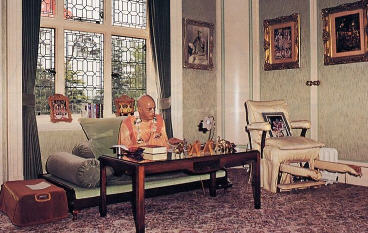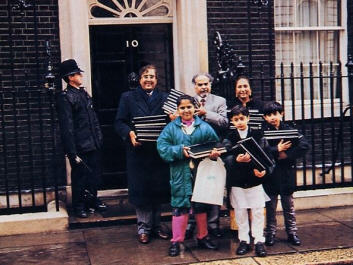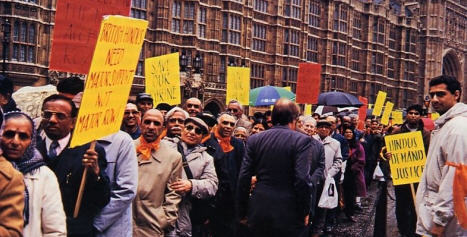The British government decides: The temple must stay open!
After a ten-year struggle, ISKCON has secured the right for all devotees to worship and attend festivals at Bhaktivedanta Manor, the Hare Krsna center outside London. The British government has overturned a local government order to close the gates. ISKCON has won the go-ahead for a new access road, and with the new road the temple can stay open for all.
The Vision

Sri Sri Radha-Gokulananda
SET IN SEVENTEEN ACRES of gardens and pastures, Bhaktivedanta Manor is the most important shrine for the devotees of Lord Krsna in Great Britain. George Harrison of the Beatles donated the Manor to the Hare Krsna movement in 1973, and that same year Srila Prabhupada installed the Deities Sri Sri Radha-Gokulananda.
Srila Prabhupada had a vision for Bhaktivedanta Manor. He wanted to bring forth the spiritual atmosphere of Vrndavana, Lord Krsna's supreme abode, with a community of devotees dedicated to serving Krsna. He wanted Bhaktivedanta Manor to be an ideal place for Krsna consciousness.
The Hindu community in North London accepted the Manor as their local temple. They admired the high standard of worship. They were impressed at how devotees were keeping to the traditional practices of sanatana-dharma, the eternal culture of Vedic spiritual life. People respected Srila Prabhupada and his work and felt grateful that the Manor was meeting their spiritual needs.
But some of the Manor's neighbors were unhappy about the large numbers of pilgrims the Manor began to draw. Here is what happened.
The Struggle
• 1973. The Council for the Borough of Hertsmere, the local government authority, grants the Manor the right to operate as a theological college. Srila Prabhupada sets up a Krsna conscious college, with a shrine. Traditionally such a shrine is always open to the public.

• 1981. As the Manor grows in popularity, Hertsmere Council clamps down and bans all festivals. The Council later withdraws the ban and signs a compromise: The devotees agree to hold only six large festivals a year, and the Manor can stay open.
• 1985. A new wave of complaints. When two devotees buy property in the local village, a local councillor (his grandfather had owned the Manor) leads fourteen villagers in a campaign against "a takeover by outsiders." The Manor is "too popular," it draws "too much traffic" and "too many Hindus." The Council hires a count of devotees visiting the Manor with separate counts for "coloured" and "white."
• 1986. The Council tries but fails to get a High Court order to stop people from coming to the Manor on Sundays.
• 1987. On its own, the Council throws out the agreement allowing six festivals a year and issues an "enforcement notice" to shut out the public entirely.
• 1988. The Council offers planning permission for a temple at another site. But when an application is handed in, the Council turns it down.
• 1988. Devotees appeal the enforcement notice to the Department of the Environment.
• 1989. The "Save the Manor" movement swells. Supporters hold protests, petition the government, and seek help from political leaders. The Hindu community rallies to the cause.
• 1989. Seven thousand people join cricket star Sunil Gavaskar and actor Rishi Kapoor in a "sponsored walk." Each step is a prayer: "Keep our temple open for worship." The walk raises £100,000 for legal expenses and becomes the largest Hare Krsna chanting party ever to come together outside India.
• 1990. The Secretary of State denies the appeal.
• 1991. More disappointments. A Manor appeal is turned down by the High Court. A Court of Appeal says no. The European Court of Human Rights says its hands are tied: "British planning laws." Political help fails. Every legal channel is exhausted. On March 16, 1994, the temple is scheduled to close.
A New Direction
We sat watching Srila Prabhupada's desire for Bhaktivedanta Manor slipping from our hands. We intensified our prayers and told the community, "We have lost many battles, but still the gates of the temple are open for you. Surely Lord Krsna won't refuse His devotee's desire."

Member of the U.K. Indian Community
We daily recited a prayer: "Dear Lord, if You so desire, for the pleasure of Your pure devotee, Srila Prabhupada, please keep Bhaktivedanta Manor open for all Your devotees."
In 1987 we had thought about building a new road to give access to the temple without going through the village but the land for the road had been unavailable. Now we decided to try again.
Just months before the temple was to close, the land suddenly came within reach. We quickly raised £300,000 and bought it. Here was a way to meet the villagers' concerns but still keep the Manor open: We applied to the Council for permission to build the road.
By now the Manor had become a national, even international, issue. More than one hundred Members of Parliament joined the list of supporters. Letters for saving the Manor poured into the British government from around the nation, and abroad.
But time was running out. March 16 was only months away and the Council kept our application in their pocket.
On Wednesday, March 16, 1994, the enforcement notice took effect. Now the temple was legally bound to stop public worship. On that day, 36,000 people, from all over England, marched in central London to protest: "Today we are banned from worship shame on the British government. We shall defy this ban! We shall protect our temple from closure, protect dharma from attack."
Akhandadhi Dasa, president of the Manor, announced good news: "The Council has bowed to you. They are feeling the pressure." The Council had granted that while the application was pending, the temple gates could stay open. Akhandadhi said, "The tide is turning."
One Step from Victory
Our planning application was sound. Even the Council's own planning experts said so. Our new road would preserve and enhance the environment and keep temple traffic from entering the village.
But what the experts for the Council recommended, the politicians on the Council refused. They rejected our application. The Council was adamant: No worship at Bhaktivedanta Manor! No Hindu temple in the village!
As 1995 began, we appealed again to the Department of the Environment. The ensuing Public Inquiry stretched on for six months. Now many community leaders, religious leaders and even many local villagers spoke out in our favor.
Martin Palmer of the International Consultancy on Religion, Education and Culture: "The Manor has become one of the most important pilgrimage centres of any faith in the UK."
Kishore Ruperalia, Secretary of the Vishva Hindu Parishad (World Hindu Society): "Hundreds of Hindu youths in the UK have taken to a pious and clean life as a result of the teachings and guidance they received from Bhaktivedanta Manor."
Reverend Christopher Lamb, representing the Church of England: "Some way of allowing the worship to continue must be found."
The Manor Is Saved
Though still banned, worshipers continued to visit the temple. For allowing them in for the Janmastami festival Lord Krsna's birthday in 1994, the temple was prosecuted. It thus became the first religious community in the last three hundred years to be prosecuted in England for observing worship. The result: an unprecedented fine of £37,000.

Then suddenly the Department of the Environment announced its decision: thumbs up on our proposal.
The Secretary of State wrote in his decision that the Manor "is unique in the UK because there is no comparable alternative place for teaching, worship, and meditation." The Manor, he said, "is by tradition and association an important place the home to a very special shrine and Deities of the highest significance to the followers of Krishna consciousness…"
The Secretary noted, "The close association of the Hare Krishna movement's founder with the Manor makes it a special if not unique place. … That association must continue."
On the first Sunday after the decision, hundreds of devotees and pilgrims came to offer their thanks to Lord Krsna. People cried, cheered, clapped, and bowed their heads before the Deities.
The "Save the Manor" campaign has enlarged the fame and the extent of Bhaktivedanta Manor. What was once a temple dear to the people of North London has now become dear to devotees all over the country, and all over the world. And what started as an estate of seventeen acres has now become seventy.
Who knew this would be the outcome of a battle that so nearly ended the mission of Bhaktivedanta Manor? Undoubtedly this has come about because of Lord Krsna's desire to fulfill the desire of Srila Prabhupada. As Srila Prabhupada's servants, we pray to become instruments in Krsna's inconceivable plan.
Bhakta Pradip Gajjar was among the main organizers of the "Save the Manor" campaign.
The Team Behind the Victory
Akhandadhi Dasa, who joined the Manor in 1975, carried the weight of the campaign to keep the Manor open. He expertly managed the legal affairs, many times outwitting opposing lawyers. As temple president, he ensured that at every stage Srila Prabhupada's dreams and the work of Bhaktivedanta Manor were shown rightly. When people recall the campaign they will recall Akhandadhi's moving and uplifting words of encouragement to the community.
Naresh Chadha
Naresh Chadha, the Chairman of the Hare Krishna Temple Defence Movement, spread the message of the campaign throughout the Indian community. He helped organize public gatherings and demonstrations, bringing people together from all parts of the country. And he was a spearhead for the historic gathering of 36,000 on March 16, 1994.
Frank Ward
From the day in 1986 when he heard that Bhaktivedanta Manor was suffering injustice, Frank Ward, a Labour councillor at Hertsmere, worked with the Manor campaign. He persuaded his Labour colleagues at Hertsmere to support the temple. And they had pledged to safeguard public worship at the Manor if appeals to the government failed. In the last ten years he took the campaign to Nepal, India, and South Africa. He has become a good friend of all the devotees and a lover of Krsna prasadam, the food first offered to Lord Krsna. Devotees have nicknamed him Arjuna Dasa, after the famed upholder of religion.
A Note Of Thanks
On behalf of the devotees of Bhaktivedanta Manor, special thanks to:
Sivarama Swami, ISKCON's Governing Body Commissioner for the U.K.
The devotees of the Bhaktivedanta Manor Foundation, headed by Pranabandhu Dasa and Sruti Dharma Dasa
The Council of Patrons of Bhaktivedanta Manor
The members of the Hare Krishna Temple Defence Movement
Kishore Ruperalia, Secretary of the Vishva Hindu Parishad
C. B. Patel, Editor of Gujarat Samachar
O. P. Sharma, President of the National Council of Hindu Temples
Shantoo Ruparell, of Singh & Ruparell Solicitors (instructing solicitors for the campaign)
The members of the spirited youth group Pandava Sena
The public relations team: Atmanivedana Swami, Bimal Krsna Dasa, and Bhagavat Dharma Dasa
We would also like to thank the community of devotees worldwide, our friends and well-wishers, and all who have supported this campaign by writing letters, signing petitions, and offering sincere prayers for Bhaktivedanta Manor.
